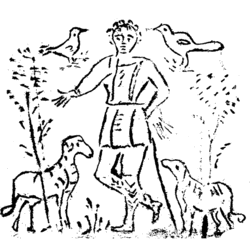Robene and Makyne

"Robene and Makyne" is a short poem by the 15th-century Scottish makar Robert Henryson. It is an early written example of Scottish pastourelle, derived from the ballad stanza form.[1]
Origins and structure
[edit]
Robene and Makyne (also spelt Mawkin) are stock names for peasant characters, a shepherd and a country maiden. Henryson presents the two characters in the sparest of terms and much in the poem has to be inferred. Strictly speaking, nothing in the text verifies precisely who Makyne might be. In the first half of the poem, she declares longstanding love for Robene, but he is indifferent to her feelings. Minds quickly change and in the closing arc the hopeless declaration is from Robene. This simple dramatic reversal comes at the golden section. Makyne's rejection of Robene is final.[2]
Henryson's writing suggests subtexts around the issue of chastity, a material issue in the late medieval Church and of possible relevance in the poet's own life [citation needed]. The spareness allows different and perhaps dissonant readings to be simultaneously present, but any "allegorical" implications are present without pretentiousness or loss of authentic feeling and the poem stands as a simple comic creation with a surprisingly wide range of emotion and intriguing tonal ambiguity [citation needed].
The closure, peculiar in its effect, evokes feelings of emptiness and a sense of musical return.[3]
Extract
[edit]Stanzas 12 and 13 of "Robene and Makyne," where the first stanza is spoken by Makyne, followed by Robene:
- "Robene, thow hes hard soung and say
- In gestis and storeis auld,
- The man that will nocht quhen he may
- Sall haif nocht quhen he wald.
- I pray to Jesu every day
- Mot eik thair cairis cauld
- That first preiss with the to play
- Be firth, forest or fawld."
- "Makyne, the nicht is soft and dry,
- The wedder is warme and fair,
- And the grene woid rycht neir us by
- To walk attour allquhair;
- Thair ma na janglour us espy,
- That is to lufe contrair;
- Thairin, Makyne, bath ye and I
- Unsene we ma repair."
See also
[edit]References
[edit]- ^ Moore, Arthur K. (1948). "Robene and Makyne". The Modern Language Review. 43 (3): 400–403. doi:10.2307/3716768. JSTOR 3716768.
- ^ Cornelius, Michael G (2003). "Robert Henryson's Pastoral Burlesque 'Robene and Makyne' (c.1470)". Fifteenth Century Studies; Rochester. 28: 80–96. ProQuest 750842865.
- ^ "I do not know which to prefer,
- The beauty of inflections
- Or the beauty of innuendoes,
- The blackbird whistling
- Or just after."
- Wallace Stevens, "Thirteen Ways of Looking at a Blackbird."
Further reading
[edit]- Henryson, Robert (1824). Robene and Makyne: And The Testament of Cresseid. James Ballantyne.
- Flynn, Caitlin (15 December 2019). "Courting Love: Comedy and Genre in Robene and Makyne". Studies in Scottish Literature. 45 (2): 83–97.
- Petrina, Alessandra (1999). "Deviations from Genre in Robert Henryson's 'Robene and Makyne'". Studies in Scottish Literature. 31 (1).
External links
[edit]- "Tom Scott on Henryson's Short Works", by the 20th-century Scottish poet and critic Tom Scott (1918–1995)
